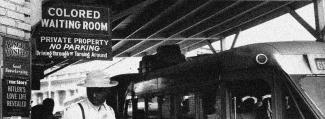MLK, Jim Crow, and the Rule of Law

The legacy of Dr. Martin Luther King, Jr., like that of most mortals, evokes a certain ambivalence regarding what should be celebrated and what should be rightly critiqued. There are certainly parts of his life and thinking that warrant correction, rebuke, and challenge, but this will be true of all us if we live long enough.
On this MLK holiday, however, I am thinking about my parents. My parents spent the first third of their lives being denied the equal application of the rule of law because of Jim Crow laws.
A World of Unjust Rules
During Jim Crow, my parents could not trust the justice system. State and local courts of justice were unreliable. My parents were not free to take road trips wherever they pleased, especially at night. They were not allowed to attend certain elementary and high schools. They were not allowed to even apply to several colleges. They were not allowed to equally compete in the marketplace against whites in the South. What made Jim Crow additionally immoral is that there were laws that protected a particular class of people so that they could not suffer the consequences of racial discrimination.
Jim Crow protected whites in the South from learning the hard lesson that racial discrimination is bad for business and undermines social flourishing.
Jim Crow only lasted as long as it did (1877 to 1954) because of a network of coercive laws, expanding government over time, enacted to keep blacks from benefiting from the freedoms gained after the end of the Civil War. In fact, many are unaware that Jim Crow laws were enacted, in part, because many southern whites were losing market share to black entrepreneurs and laborers. After the Civil War, the low-skilled labor market received an influx of able-bodied men and women that various agricultural and industrial sectors could employ. Moreover, because many blacks had learned real skills on plantations, many were free to turn those skills into small businesses. This two-tiered level of competition was not welcomed and Jim Crow laws were enacted.
This was the world in which my parents spent the first third of their lives. A world where the rules were different. A world where they were not free to offer their gifts and talents in the marketplace.
Why the Rule of Law Matters
This may explain why so many of us champion the significance of the rule of law. Equally applied rules are the best protection against the oppression of the poor and provide, along with free markets, the best opportunity for families to improve their standard of living over time while contributing to the common good. Jim Crow denied my family this opportunity.
My parents did not start competing under the same rules until the late 1960s but by that time children were in the home and responsibilities shifted. To make matters worse, Congressional leaders in the 1960s and 1970s inadvertently subverted the speed of black progress by introducing more coercive laws in the name of making things better. Sadly, progressive politicians seem to have forgotten that the solution to one set of expansive arbitrary coercive laws is not to enact a brand new set of arbitrary coercive laws in the name of “justice.”
Even with muddled beginnings, I am, in principle, extremely grateful for MLK’s legacy as someone who woke up America to the fact that the rule of law is the birthplace of justice. I am thankful. Because of Dr. King’s leadership, my siblings and I were able to take advantage of the freedoms that the previous generations in my family could only dream about.
—
For more on justice and the rule of law, see Episode 4: The Economy of Order
Originally published at the Acton PowerBlog
Photo credit: Wikipedia (modified)
- Log in to post comments
